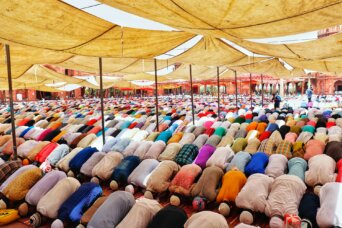- About
- Topics
- Picks
- Audio
- Story
- In-Depth
- Opinion
- News
- Donate
- Signup for our newsletterOur Editors' Best Picks.Send
Read, Debate: Engage.
| topic: | Islamophobia |
|---|---|
| located: | India |
| editor: | Hanan Zaffar |
In an unprecedented move, the Indian government, led by the Hindu-nationalist Bhartiya Janata Party (BJP), suspended two of its officials for insulting the Muslim prophet Muhammad. While islamophobic sentiments are not new to India's right-wing corridors, the response to this particular incident has been unique.
The move, as being widely perceived, was not intended to punish the act of offending Muslims, as the ruling BJP thrives on such agenda, but rather to calm the Muslim world, particularly the Arab nations, which erupted in a series of diplomatic protests against the insult. Countries like Qatar, Kuwait, Saudi Arabia and UAE, with which India enjoys friendly relations, protested against the controversial comments against the prophet Muhammad.
The BJP spokespersons’ demeaning remarks about the prophet of the Islamic faith come against a backdrop of blatantly growing islamophobia and anti-Muslim discourse in India. The BJP has used anti-Muslim sentiments as a convenient and effective tool for its political and electoral gains, condoning anti-Muslim statements by party leaders, ideology supporters and even ordinary citizens. These hateful remarks have given rise to hate crimes against Muslims - who constitute nearly 15 percent of the country’s population.
The ruling party, on its part, has not only ignored such incidents, but has also discernibly ‘encouraged’ them. A few notable examples include the open calls by a Central Minister for the shooting of Muslims, the encouragement by BJP-aligned Hindu gurus for the genocide of Muslims and the declaration of the Chief Minister of Uttar Pradesh that the state elections are a battle between “80 percent Hindus” and “20 percent Muslims.”
Following the provocative remarks by the BJP spokespersons, the anger of Indian Muslims poured in, both online and offline. In the Uttar Pradesh-city of Kanpur, Muslim citizens gathered on roads to protest after the Friday prayers. However, the authorities dealt with it in a harsh manner, arresting dozens of Muslims under stringent laws, and threatening the demolition of their houses - a new trend by Indian authorities to intimidate the Muslim population.
Yet, it was not this outpouring of genuine anger by the country’s citizens that prompted the government to take action, but rather the prospects of harming its monetary equations with the Arab world.
In the recent past, India has developed very close relations with west-Asian countries which have been extremely beneficial to the country’s economy. Around 7.6 million Indians live in the Middle East, bringing billions of dollars in remittances to the country. Critics of the Indian government argue that dissatisfaction among Arab nations, as evidenced by their protests, prompted the Indian government to react - and not the anger of Indian Muslims, let alone the sense of responsibility towards them.
As the BJP suspended its members, one will have to wait to see if any concrete actions will be taken against the former spokespersons to ensure that such things do not happen again. However, given how polarised on religion Indian polity stands today, it is difficult to believe that the ruling party would change its policy of vilifying Muslims, for in their vilification lies the success of their electoral consolidation.
Photo by Shivam Garg

